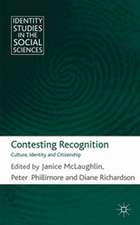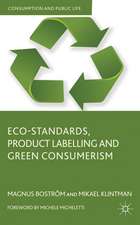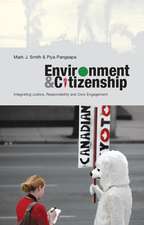Citizen-Consumers and Evolution: Reducing Environmental Harm through Our Social Motivation
Autor Mikael Klintmanen Limba Engleză Hardback – 30 oct 2012
Preț: 452.09 lei
Nou
Puncte Express: 678
Preț estimativ în valută:
86.52€ • 89.78$ • 72.31£
86.52€ • 89.78$ • 72.31£
Carte tipărită la comandă
Livrare economică 17-31 martie
Preluare comenzi: 021 569.72.76
Specificații
ISBN-13: 9781137276797
ISBN-10: 1137276797
Pagini: 153
Ilustrații: X, 153 p.
Dimensiuni: 140 x 216 x 13 mm
Greutate: 0.36 kg
Ediția:2013
Editura: Palgrave Macmillan UK
Colecția Palgrave Pivot
Locul publicării:London, United Kingdom
ISBN-10: 1137276797
Pagini: 153
Ilustrații: X, 153 p.
Dimensiuni: 140 x 216 x 13 mm
Greutate: 0.36 kg
Ediția:2013
Editura: Palgrave Macmillan UK
Colecția Palgrave Pivot
Locul publicării:London, United Kingdom
Cuprins
Introduction Three Approaches Apollonian and Dionysian Trust Rebound Effects and Spillovers Single Policy and Planning Issues Wider Societal Change Conclusions and Discussion
Recenzii
'Debates surrounding threats to environmental integrity and the potential for sustainable development are contentious, and proposals regarding appropriate public policy vary widely. Klintman argues forcefully that effective policies encouraging global citizens to act in ways that are more eco-responsible must be rooted in a clear grasp of human nature. Absent attention to
behavioral dispositions deeply rooted in our species's distant ancestry for example, our inclinations toward status striving and self-deception prospects for workable solutions are dim. Klintman makes a compelling case, and his book illustrates the value of forging a productive alliance between environmental sociology and the evolutionary behavioral sciences.' - Timothy Crippen, Professor of Sociology, University of Mary Washington, USA
'Klintman's goal is to learn how we can motivate people to avoid "environmental harm". He discards the boundary-maintaining fixed beliefs that have put sociology at risk of being left on the side of the road. The result is pragmatic sociological theory that is compatible with current understanding of the biological underpinnings of human behavior.' - Jerome H. Barkow, Honorary Professor, Institute of Cognition and Culture, Queen's University of Belfast, UK and Professor Emeritus of Social Anthropology, Dalhousie University, Halifax, Canada
behavioral dispositions deeply rooted in our species's distant ancestry for example, our inclinations toward status striving and self-deception prospects for workable solutions are dim. Klintman makes a compelling case, and his book illustrates the value of forging a productive alliance between environmental sociology and the evolutionary behavioral sciences.' - Timothy Crippen, Professor of Sociology, University of Mary Washington, USA
'Klintman's goal is to learn how we can motivate people to avoid "environmental harm". He discards the boundary-maintaining fixed beliefs that have put sociology at risk of being left on the side of the road. The result is pragmatic sociological theory that is compatible with current understanding of the biological underpinnings of human behavior.' - Jerome H. Barkow, Honorary Professor, Institute of Cognition and Culture, Queen's University of Belfast, UK and Professor Emeritus of Social Anthropology, Dalhousie University, Halifax, Canada
Notă biografică
Mikael Klintman is Professor of Sociology at Lund University, Sweden and a former Wallenberg Research Fellow in Environment and Sustainability at Massachusetts Institute of Technology, USA. His previous publications include Eco-Standards, Product Labelling and Green Consumerism (with Magnus Boström).
















